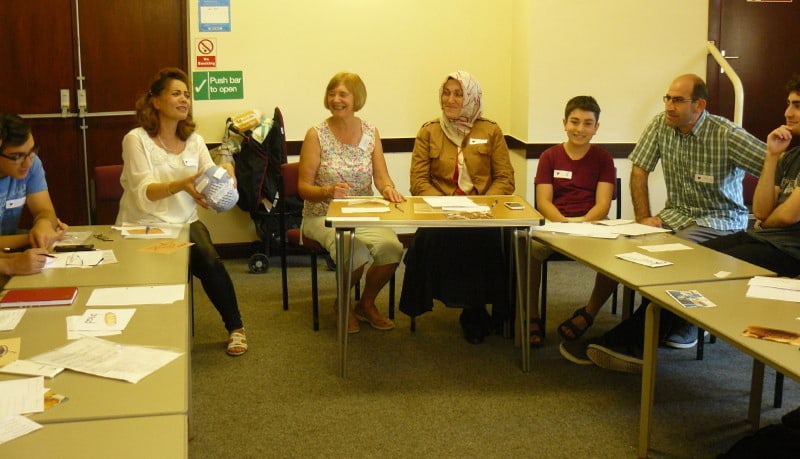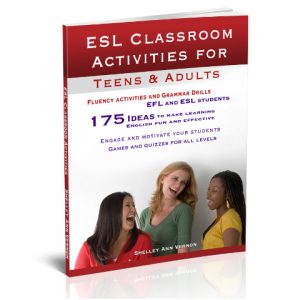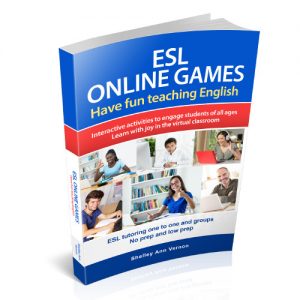Teaching refugees English requires care. Students may be vulnerable and need a relaxed and positive environment. A teacher needs to make students feel safe and welcome. To achieve this friendly atmosphere, teachers should consider games. Games are more than just a fun break from worksheets and textbooks. Instead, they are crucial tools for teaching refugees English. Games can address problems that impede students’ progress in learning a language. For example:
- Helping beginners through the “silent period”
- Catering to different learning styles
- Easing tension between students in class
- Helping with irregular class attendance
Some great reasons to use ESL games when teaching English to refugees are: They provide structured independence for beginners and facilitate learning in different styles, maximizing your students’ chances of absorbing the language. In addition, ESL games allow the teacher to have student-to-student practice while maintaining control over the content of that practice. Finally, games also add flexibility to planning for classes where attendance is unpredictable.
Teaching Beginners and Anxious Students
One of the most frustrating things when teaching refugees English is “the silent period.” This time usually covers the first 3-6 months of language learning, during which students absorb a new phonetic system, vocabulary, grammar structure, and cultural cues. So it’s completely natural and normal not to speak much at all during this period. After all, infants have well over a year where we don’t expect them to say a thing beyond nonsense babbles. Adults, however, get frustrated. Infants are developing in so many ways that we don’t think about their lack of speech. Still, adults who have successfully communicated in their native tongue for many years don’t appreciate feeling like a toddler linguistically. Enter the ESL teacher with a game or ten up their sleeve.
ESL games address basic skills that all learners need to master. In addition, they provide students with the chance to communicate successfully in a structured or patterned way, with the meaning demonstrated and integrated into the lesson. By comparison, repetition without comprehension would not be nearly so effective.
Brilliant games for the silent period
Round Robin Advice fits the “silent period” well, since the students can have their parts of the interactions written out and practiced in advance. Then, they only have to select the correct response from the pre-written choices. Other games, like Grammar Auction, put the focus on a non-linguistic goal – making ‘money,’ or points, through bidding on grammatically correct sentences. Here, even quiet students will start calling for your attention because they aren’t worried about what they are saying. Instead, they are focused on winning the auction.
Language games with highly patterned interactions are wonderful for beginners. Good Evening Beach Ball wakes up your tired business person. And it takes the pressure off because when they catch the ball, all they have to do is read the phrases their thumbs are pointing to and then throw it to the next person. You’ll understand what an impact this class opener can have when you walk in one day and the student who never says anything without being prompted grins and says, “Good evening.” And there’s no beach ball in sight!
There are all kinds of games that help review vocabulary in a general way and anchor understanding of the word’s meaning. For example, ESL Vocabulary Baseball is great for practicing spelling and also for definitions and sentence making. Mind Mapping is an activity where the class creates a picture or diagram of related vocabulary. It is a wonderful cooperative game that helps students remember new words and make associations that support the proper use of the word.
Variety in ESL Learners
ESL games continue to be significant with intermediate and even advanced students. One reason for this is what educational psychologists refer to as learning styles. Are they auditory learners who learn easily from a lecture? Visual learners, who do better with reading and video presentations? Perhaps your students are tactile or kinesthetic learners who benefit most from getting up, moving around, and making things. No matter their primary learning preferences, the more skilled all your ESL students become at using different styles, the more successful they will be at learning in general.
Therefore, ESL games are the perfect tool for encouraging greater flexibility in learning styles. Many ESL games that suit one group have elements that will appeal to students with another learning style. Consequently, playing them improves comprehension across the board.
Tensions in the ESL Classroom
Sometimes you will be faced with outside tensions coming into your classroom. Including ESL games in your lessons can help you create safe and interesting interactions among your students. Stress points within a class can come from mixed cultural backgrounds, current events such as war and immigration. In addition, you may have students with personal difficulties such as learning disabilities.
For example, For example, if you have ever had students from Saudi Arabia and California in the same class, it’s probably easy to imagine tension that may arise between male, female, or LGBT students. In England, during the fighting in Bosnia, it was not unusual to have students from each side of the conflict sharing the same class while recovering from terrible losses.
In these cases, a teacher must constantly balance the need for open-ended practice with creating a safe space for learning. ESL games are vital tool in maintaining this balance. They can help to break tension among students through highly structured interactions.
You can avoid personal information games in touchy situations, such as war victims. Avoid ‘get to know you’ games and use made-up scenarios instead. It is also best to hold off on open-ended role plays until you feel you know the students well enough to have a good idea of the role-play’s direction. It is always better to start with more structure and control, then loosen up as you get a better feel for the class.
More excellent games for tricky situations
Scripted games that practice a particular grammar point are an excellent way to start students practicing and working together neutrally. For instance, in ESL Activities for Teens and Adults, the verb review game Things We Do, where the teacher gives a category. Then, students come up with sentences using associated verbs.
English Trivia is another good game for reviewing both language points and cultural information in a reasonably neutral format. Crossword puzzles, Concentration, and Build-a-Sentence are games that need structured student interaction and thus can be steered away from problematic areas. Goal-oriented role-plays, like shopping games where students are trying to buy a particular set of ingredients, start to get more open-ended. Therefore, the teacher can introduce greater freedom for students while still setting boundaries for the interactions.
ESL Class Attendance
It is common to have unpredictable attendance in adult ESL and business classes because work schedules can change suddenly. Therefore, it is always good to have activities that expand and contract easily for when you don’t know how many will come to a lesson. After all, it isn’t unusual to have anywhere from one student to the entire class when you are doing evening classes.
Without some preparation, you could run out of things to do or find yourself at a loss for how to expand an activity you meant to use with only a few students. For example, if you have a class of ten and only four show up, you may find the lesson over with very quickly.
On the other hand, if all your students attend, and you are used to three or four of them, change from a small group activity to a game that can accommodate everyone.
Further games ideal for teaching refugees English
Paper based games like a treasure hunt based on the text you’ve been using are easy to put together quickly. Just have students work on skimming for examples of grammar or facts. Have them skim to answer a list of questions and award points to the team that finishes first with the most correct. Alphabet war is a great card game since you can play it in as many pairs as you need. Conveniently, the only materials required are index cards and pencils. It expands easily if you have students make their own decks as part of the activity.
Most quiz games scale to any size class and are great for review. When you have very few students and want to make it more fun and less like an interrogation, play a game like Pyramid. Here, students play against the clock and get points for how fast they get through each level.
ESL games in the classroom are truly useful and fun. They simulate the unpredictable world outside your classroom and allow students to use their new language skills in a structured low-stress environment. The more games you have up your sleeve, the better you will be at teaching refugees English. You’ll be more successful at preparing your students for exams and the real world.
Two excellent resources for teaching refugees English
-
Games
Games and Activities for Teens and Adults
Rated 5.00 out of 5€19.97Original price was: €19.97.€15.33Current price is: €15.33. Add to cart


